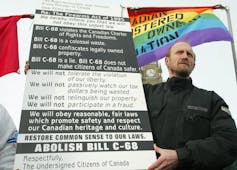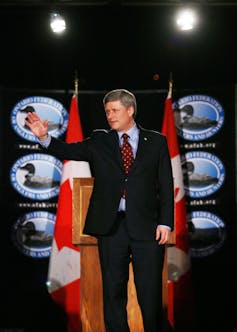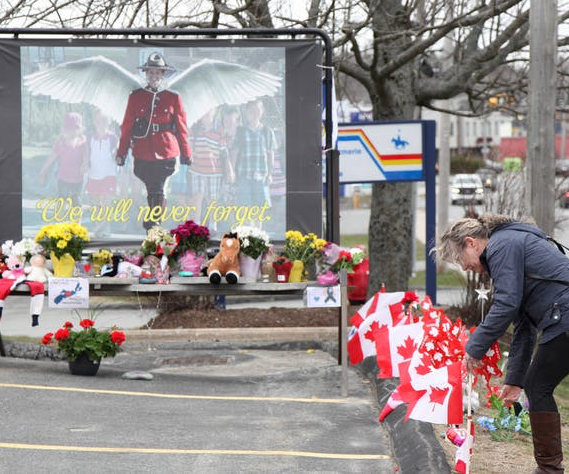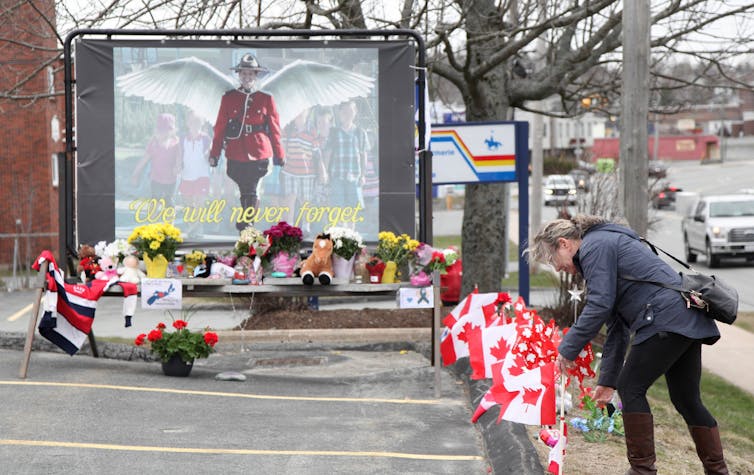A woman places a pinwheel in front of a mural dedicated to slain RCMP Const. Heidi Stevenson, a victim of a shooting rampage carried out by a man with unlicensed weapons, in Cole Harbour, N.S., on April 24, 2020. THE CANADIAN PRESS/Tim Krochak R. Blake Brown, Saint Mary’s University
The federal government is reportedly preparing to ban assault weapons following the recent mass shooting in Nova Scotia. The man who killed 22 people in the province had illegally stockpiled firearms.
Gabriel Wortman’s father said his son had a “helluva a gun collection.”
The RCMP says he did not have a firearms licence yet had handguns and semi-automatic rifles, including firearms sourced from the United States.
It’s troubling that Wortman could accumulate the weapons and ammunition necessary to carry out his rampage. And it’s possibly evidence of an enduring problem: gun smuggling from the United States, which provides a stream of illegal weapons for criminal gangs in Canada.
It also highlights that some seemingly law-abiding Canadians create private gun collections outside of the normal licensing and registration systems.
Hidden guns
In 2004, Bruce and Donna Montague of Ontario faced multiple charges after police seized over 200 firearms and thousands of rounds ammunition — many hidden in a secret room in the basement of their house.

Bruce Montagueholds a sign with his group’s beliefs during demonstration against gun control laws on Parliament Hill on Jan. 1, 2003. (CP PHOTO/Jonathan Hayward)
Bruce Montague was a gunsmith and a fierce opponent of gun control who became a darling of those who claimed Canadians have a right to possess firearms. He fought a lengthy battle in the courts, unsuccessfully appealing his conviction to the Ontario Court of Appeal.
People like Bruce Montague are not gang members or professional criminals. Until caught, they often appear to be law-abiding gun owners, and their defenders dismiss the charges against them as “paper crimes.” That suggests that otherwise responsible gun owners who do not abide by Canada’s firearm laws are committing victimless crimes. They and their supporters often share a deep distrust of government regulation and the state.
Several Canadian gun groups encourage this attitude and warn that many firearm laws are mere pretexts to firearm confiscations. The slogan “registration leads to confiscation” has been popular for decades.
Groups representing gun owners are generally careful to inform their members they must comply with the law, but they also warn of nefarious politicians seeking to confiscate personal property. In 2013, the Canadian Shooting Sports Association tweeted that there were “only two reasons to register something – gov’t plans to tax it or confiscate it.”
The National Firearms Association blared in a similar tweet in 2016 that “registration preludes confiscation.” Rod Giltaca, the CEO and executive director of the Canadian Coalition for Firearm Rights, tweeted in 2018 that: “Despite what all anti-gun folks have said since the beginning of gun control, registration does lead to confiscation.”
The Conservative government of Stephen Harper responded to fears of confiscation by limiting the federal government’s ability to track firearms. Most famously, his government passed legislation in 2012 to abolish the long-gun registry, despite resistance from police organizations, victims’ groups, the government of Québec and a sizeable public investment in the creation of the registry.
Tories took further steps
The Conservatives also took steps undermining the firearm licensing system and the ability of police to trace weapons that received less public attention.

Harper acknowledges the crowd following his speech at the annual general meeting of the Ontario Federation of Anglers and Hunters in Mississauga, Ont., in March 2009. THE CANADIAN PRESS/Darren Calabrese
For example, the Harper government issued a grace period for gun owners who failed to renew their firearm licences. And in 2015 it passed legislation that rolled back requirements passed in the 1970s that required gun retailers to record the sales of non-restricted firearms.
The Conservative Party continued to resist efforts to strengthen firearm record-keeping when the Liberal government of Prime Minister Justin Trudeau introduced legislation (Bill C-71) that again requires gun retailers to keep track of non-restricted firearm sales. Conservative politicians and gun groups complained that the legislation created a “back-door gun registry,” despite the fact it did not establish a centralized system of record-keeping.
The subtext of the messaging used by gun groups and some Conservative politicians is that gun owners should not trust the government when it comes to firearms. That’s dangerous, because it could encourage people to acquire guns without a licence.
While most firearm owners abide by Canada’s regulatory regime, Wortman’s actions show the possible danger of an unlicensed citizen accumulating and using stockpiles of weapons for criminal purposes. We should therefore hardly excuse people who own unlicensed weapons as only committing “paper crimes.”
![]()
R. Blake Brown, Professor, History, Saint Mary’s University
This article is republished from The Conversation under a Creative Commons license. Read the original article.
« Voix de la SRC » est une série d’interventions écrites assurées par des membres de la Société royale du Canada. Les articles, rédigés par la nouvelle génération du leadership académique du Canada, apportent un regard opportun sur des sujets d’importance pour les Canadiens. Les opinions présentées sont celles des auteurs et ne reflètent pas nécessairement celles de la Société royale du Canada.



